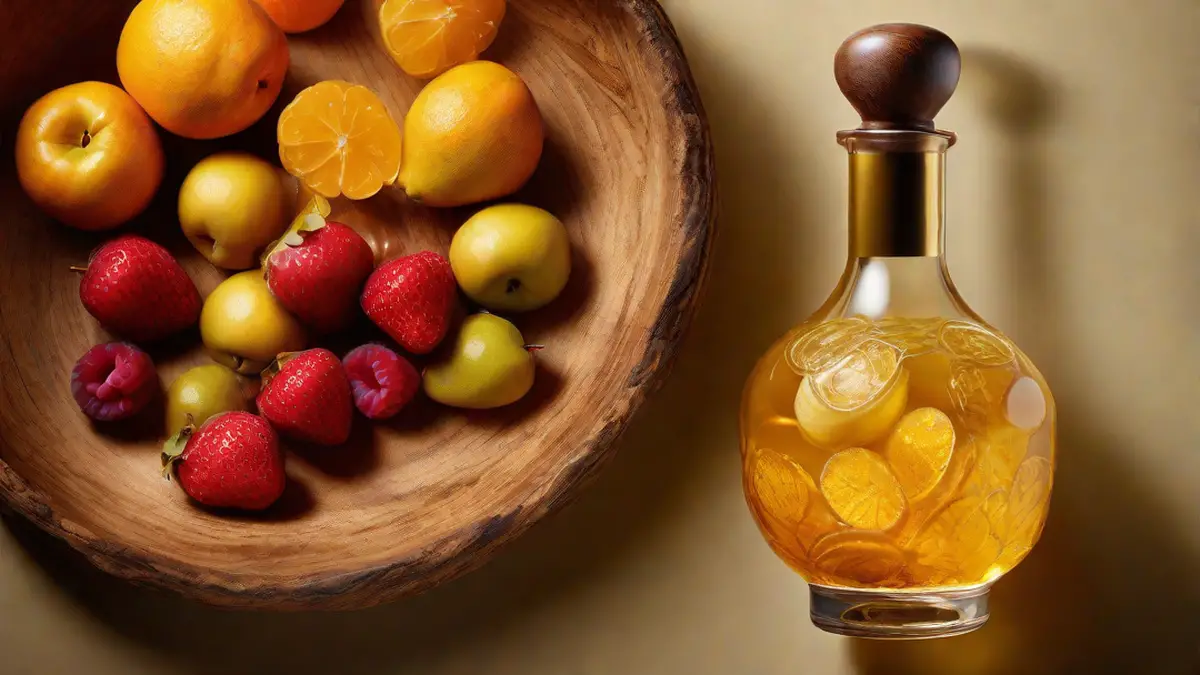Imagine an endlessly leisurely summer day unfolding before you. A radiant azure sky looms overhead as buzzing bees gleefully flit about blooming flowers. Meanwhile you find yourself reclining idly on your porch swing indulging in a refreshingly sweet elixir within reach. What could surpass the sheer perfection of a glass of wine? Yet we jest not; we refer specifically to watermelon wine! Indeed, this luscious ruby red libation, brimming with the tantalizingly fresh sweetness derived from summers’ most coveted fruit, is guaranteed to arouse your taste buds and enkindle within you an insatiable craving. Eagerly prepare yourself as we embark upon an unparalleled odyssey into the world of homemade watermelon wine – from expertly selecting the juiciest melons to meticulously brewing an impeccable batch; let us embrace this remarkable voyage into winemaking together!
Understanding the Basics of Watermelon Wine
Watermelon wine is a truly delightful elixir. Offering a surprising twist on traditional fruit wines. This sweet and refreshing beverage is meticulously crafted from the juice of watermelons showcasing the remarkable versatility of this beloved summer fruit. The process of creating watermelon wine is nothing short of intriguing.
It begins with carefully selecting ripe and juicy watermelons. As their quality directly impacts the taste of the final product. Next comes extraction, during which we expertly squeeze out the nectar from these vibrant ruby red fruits.
Following extraction fermentation takes place – an absolutely fascinating process! The natural sugars in the watermelon juice are converted into alcohol by yeast during this transformative stage.
The result? Our beloved watermelon wine!
But hold on a moment – theres more to it than meets the eye. Aging plays a crucial role in achieving the perfect balance of sweetness and tartness in your homemade wine. Through aging flavors blend together harmoniously and mature over time culminating in a smoother and more decadent taste experience.
Last but certainly not least is bottling! This final step preserves all those complex flavors that were meticulously developed during aging. Allowing you to savor them at your leisure.
It becomes evident that making watermelon wine transcends mere ingredient mixing; it truly is an art form.
Each step of this enchanting process demands precision techniques and meticulous attention to detail – all contributing to its distinct flavor profile. Instead of feeling overwhelmed by such complexity.
Embrace it! By grasping these basics. You can embark on a wondrous journey into the captivating world of homemade watermelon wine
Selecting the Perfect Watermelon for Your Wine
The first step towards crafting an exquisite watermelon wine is choosing the right watermelon itself. The taste, color, and aroma of the wine are directly influenced by the quality of the fruit utilized. Now how do you go about selecting this perfect specimen?
Size and shape play an important role here. Opt for a medium sized watermelon that boasts symmetry in its form; irregularities could be indicative of uneven ripening or growth issues.
While size does have some significance remember that bigger isn’t necessarily better in this case! Moving on to color – aim for a striking green hue with slightly darker stripes running across it uniformly. A creamy yellow spot on one side indicates that ripening has occurred where this melon made contact with the ground below.
An additional aspect to consider is weight. An ideal watermelon should feel heavy in relation to its size – a clear indication of its high water content. So don’t hesitate to lift a few before making your final selection!
Lastly.
Gently tap the watermelon; if it produces a hollow sound. You can rest assured that its ripe and ready. Now that you are equipped with this knowledge.
Go ahead and pick your star ingredient! Keep in mind that exceptional produce is what sets apart an outstanding wine. Perfecting your selection will take time and patience but it will undoubtedly enrich your homemade wine experience significantly.
Essential Ingredients and Equipment for Making Watermelon Wine
Are you ready to embark on the exciting adventure of making homemade watermelon wine? The process may seem simple at first. But it requires some intricacies. However.
The end results will be truly rewarding. Lets start by discussing the essential ingredients you’ll need. First and foremost choose ripe and juicy watermelons as they will be the primary ingredient in your wine. You’ll need approximately 15 20 pounds per gallon of wine. Which may sound like a lot. But keep in mind that watermelons are mostly water. Moving on to the next ingredient – sugar. Why do you need sugar?
Well. Its essential for boosting the alcohol content in your wine. Watermelons alone do not contain enough sugar for effective fermentation.
You’ll need around 2 3 pounds of sugar per gallon to ensure a successful process.
Additionally yeast plays a crucial role as well. It is recommended to use a specific type of wine yeast strain such as Montrachet or Champagne yeast.
These strains can tolerate high levels of alcohol and will efficiently ferment your watermelon juice.
Don’t forget about pectic enzyme and acid blend either! Pectic enzyme helps break down fruit fibers while acid blend helps balance out the sweetness in your wine.
Now lets discuss the necessary equipment for this endeavor.
It is important to have a large container for initial fermentation – a food grade plastic bucket should suffice. You’ll also require a glass carboy or demijohn for secondary fermentation and aging processes. Do not underestimate the importance of airlocks and bungs! They help keep oxygen out while allowing carbon dioxide to escape during fermentation.
Furthermore you’ll need a siphon tube to transfer your wine between containers without disturbing any sediment at the bottom. Lastly. Investing in a sanitizing solution is crucial to keep all your equipment clean and free from harmful bacteria that could potentially spoil your winemaking endeavor. Always remember, making your own watermelon wine requires patience and precision. However. With these ingredients and tools at your disposal. You are well prepared to embark on this rewarding venture.
Step-by-Step Process to Make Your Own Watermelon Wine
Step into the world of homemade wines, where creativity has no limits. One exceptional addition to this realm is watermelon wine. Yes. You read that correctly! Watermelon wine is a light and fruity beverage that is simply perfect for those sizzling summer days. Its refreshing taste isn’t all it has to offer; theres something magical about making it in the comfort of your own home.
Lets’ dive right into the step by step process of crafting this intriguing drink. To begin with. Gather your ingredients.
You’ll need a large watermelon, sugar, yeast, and water. Remember, the quality of these ingredients plays a crucial role in achieving the best results possible.
So be sure to choose a ripe and sweet watermelon.
The first step involves cutting the watermelon into chunks and extracting its precious juice. Heres an important tip – don’t discard the rind just yet! It can add an extra layer of flavor to your wine.
Next up is adding sugar. While watermelons are naturally sweet.
Adding sugar guarantees proper fermentation. Dissolve it in warm water before combining it with your juice.
Now for the exciting part – introducing yeast! This tiny but mighty organism works wonders by transforming sugars into alcohol.
Pour it into your juice sugar mixture and give it a good stir. At this point.
You’ll need some patience as fermentation takes over. Store your mixture in an air tight container at room temperature away from direct sunlight for approximately two weeks. As fermentation comes close to completion. You’ll notice a gradual decrease in bubbling – a sign that tasting time is approaching! Strain out any solid remnants and transfer your soon to be wine into clean bottles or jars.
Then comes aging – a critical step that elevates this concoction into exquisite wine. The duration of aging may vary from three months to a year depending on your level of patience.
Finally after all that anticipation and waiting its’ time to pour yourself a glass of homemade watermelon wine! Savor every sip as you revel in the satisfaction of creating something so delectable from scratch. And there you have it – an enchanting journey from juicy watermelons to fragrant wine all within the confines of your home. Now. Prepare yourself to unleash the true magic of homemade watermelon wine!
Tips and Tricks to Enhance the Flavor of Your Watermelon Wine
Watermelon wine possesses nostalgic appeal as a summertime classic bevvy that frequently escapes recognition for its vast potential when crafted at home. By incorporating a handful of innovative techniques, this unpretentious fruit can be elevated to the realm of sophisticated beverages. The enchantment begins with a judicious choice of watermelon.
It is vital to discern the variations between different melons, as not all are designed equal; some exhibit heightened sweetness whilst others possess an abundance of fragrance. Ideal candidates for your winemaking endeavor include the Sugar Baby and Crimson Sweet varieties due to their adept blend of flavor and sweetness. Next on your agenda is perfecting the precise yeast selection; a pivotal determiner in the art of winemaking. When it comes to harnessing and preserving the inherent subtleties within the watermelon, consider employing Lalvin EC-1118 yeast – celebrated for its versatile nature and skillfulness in encapsulating prized fruit flavors.
Intemperate haste must be avoided! Patient attentiveness during fermentation stands as a key factor for enabling flavors to reach their zenith. Experts suggest allowing no less than one month for fermentation, however, should one’s temperament permit it, reserving three months or even longer prior to bottling will bestow upon your creation enhanced depths of flavor. The mastery lies within achieving a well-harmonized level of sweetness when fashioning your ultimate watermelon wine product.
Extreme sugar concentrations run the risk of overpowering subtle notes while inadequate amounts may yield an insipid outcome that fails to captivate one’s interest. Aim instead for sweet equilibrium that exalts and complements rather than masking the quintessential essence embodied within watermelon itself.
Lastly but certainly not leastly, introducing supplementary elements such as lemon zest or sprigs of refreshing mint during fermentation serves to invigorate your watermelon wine with additional dimensions encompassing distinctive character and richness far exceeding mundane expectations.The process involved in creating splendid watermelon wine should respectfully be perceived neither as an inherent conglomeration
of inflexible rules nor as a constraint upon self-expression, but as an open-ended journey rife with possibilities that may be discovered through persistent experimentation and refinement. Unleash your artistic streak, luxuriate in the joys of exploration, and liberate the hidden magic concealed within each pristine bottle.
Pairing Ideas: Foods that Complement Watermelon Wine
Watermelon wine, a delightful summer favorite renowned for its sweet yet refreshing taste possesses surprising versatility when it comes to pairing with food. By exploring different combinations. You can elevate your dining experience and unlock new dimensions of flavor.
Join us on a journey through some extraordinary food pairings guaranteed to enhance the allure of your cherished watermelon wine.
To begin our exploration. Consider introducing watermelon wine to spicy dishes. The combination yields an intriguing interplay between sweet and cool flavors that dances upon your palate harmoniously.
Imagine immersing yourself in the depths of spicy Asian cuisine or savoring fiery Mexican dishes; each bite revealing a striking contrast to the wines inherent sweetness. Our next destination is the realm of delicate seafood, where watermelon wine gracefully complements these flavors. Whether you opt for succulent grilled shrimp or indulgent salmon this liquid gem will bring out the natural sweetness of the oceans’ treasures. The fruity undertones in the wine weave a symphony with the seafood.
Elevating your culinary experience to new heights. Cheese platters beckon us next. Offering a marriage of flavors that astound your senses.
Allow yourself to indulge in creamy cheeses like brie or camembert while sipping on watermelon wine – an unparalleled combination that transcends taste boundaries. The velvety richness of these cheeses intertwines flawlessly with the vibrant crispness of the wine creating moments of pure decadence.
And let us not forget about desserts in this delightful escapade! Watermelon wine thrives alongside fruity treats such as berry tarts or peach cobbler. As you relish these sweet delicacies. Allow this enchanting elixir to infuse them with an additional layer of fruitiness and equilibrium. This divine pairing harmonizes contrasting flavors and ensures every bite is an ethereal delight.
As we conclude our journey through exquisite food pairings remember to embark on your own adventures and discover personalized matches for your watermelon wine treasure trove! Embrace experimentation and immerse yourself in the pleasure derived from exploring its myriad possibilities alongside various culinary wonders.
Health Benefits of Drinking Watermelon Wine
Watermelon wine is a delightful fusion of summers bounty and age-old fermentation techniques; however it comprises more than just a revitalizing drink – it holds hidden health benefits as well. At the forefront lies hydration: staying true to its name, watermelon brims with moisture which seamlessly translates into its sophisticated wine rendition – ensuring optimal hydration during scorching weather or mealtime refueling.
But wait — theres’ more! This vividly scarlet fruit abounds in antioxidants such as lycopene and vitamin C. Remarkably though these precious compounds retain their potency throughout the fermentation process permeating each and every glass of watermelon wine you pour. Lycopene is known for its prospective cardiovascular advantages and cancer combatting properties while vitamin C fortifies your immune system. Lets’ not overlook the significance of amino acids! Watermelon stands as a natural source of citrulline – an essential amino acid that elevates blood flow and alleviates muscle soreness post exercise; a fitting reward for physically active individuals who savor a post workout glass.
Potassium is up next: an indispensable mineral that facilitates nerve function, muscle control, and fluid equilibrium within your body – it even plays a part in maintaining stable blood pressure levels! And yes indeed. Watermelon wine complements your potassium needs as well. While fiber may not be the foremost characteristic that springs to mind when pondering wine rest assured that watermelons present this element too! Imbibing this fruity elixir contributes to your daily fiber intake further promoting digestive well being.
Thus we unveil the true enchantment of watermelon wine; transcending its tantalizing taste and breathtaking blush hue – each blissful sip ushers forth an abundance of health benefits as well! However it is imperative to imbibe responsibly with moderation as the guiding principle; only then can you bask in the full splendor bestowed by any alcoholic beverage.
Troubleshooting Common Issues in Winemaking
Watermelon wine is a delightful summer treat but making it doesn’t always go smoothly. Troubles are simply part of the game. Lets’ discuss how to troubleshoot these issues. The heart of winemaking lies in fermentation. But sometimes it can go wrong.
If your watermelon wine refuses to ferment. Don’t panic! Insufficient yeast nutrients or incorrect temperature could be the culprit. The solution here is to boost nutrient levels or adjust your thermostat accordingly.
If you detect a moldy smell in your wine. Its definitely a problem. Bacterial infection or oxidation might be the cause. To tackle this issue make sure you sterilize your equipment more thoroughly next time and seal your containers properly. Another hiccup you might encounter is hazy wine.
This can occur due to pectin haze, which is often found in fruit wines like watermelon wine. Luckily pectic enzyme is the savior in this situation. Having a vinegary taste in your watermelon wine isn’t desirable either right? Acetic acid bacteria may be at play here converting alcohol into vinegar when exposed to air during fermentation.
Remember that patience is key in winemaking – allow nature to work its magic with time and care on your side.
To sum up. Troubleshooting these issues should not be daunting if we understand their root causes and their respective fixes.
Incorporate these tips into your own winemaking journey and watch the magic of watermelon wine flow freely!




